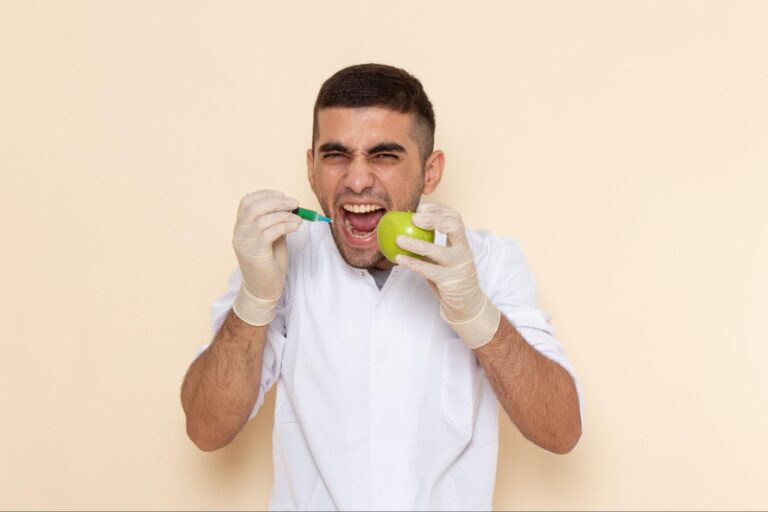Can You Eat After A Root Canal?
Wondering if you can eat after a root canal? It’s a common question that troubles many after this dental procedure. This blog will guide you through what to eat and avoid, ensuring your recovery is as smooth as possible.
Aftercare Tips for a Root Canal Procedure
After a root canal, your diet plays a vital role in recovery. Choose soft foods and be careful with how you eat to avoid discomfort.
Be mindful of how you eat, not just what you eat.

Eating after a root canal requires careful consideration of how you consume your meals. Chewing on the treated side can cause discomfort, especially if the anaesthetic has not fully worn off.
Use the other side of your mouth to avoid placing stress on the affected area. Soft foods after root canal treatment will be easier to manage and less likely to irritate any tenderness or swelling.
Choosing gentle options like smoothies and yoghurt is key for recovery. Ensure that food is cut into small pieces, making it less demanding on your teeth while eating post-root canal.
Foods such as mashed potatoes or soups are ideal during this period, providing nourishment without strain. Stay mindful of temperature too; extremely hot or cold foods might lead to increased sensitivity around the treated tooth.
Foods to eat after a root canal
After a root canal, your mouth may feel tender. Choosing the right foods can support your recovery.
- Smoothies: Thick and creamy smoothies are great options. They provide nutrients without requiring much chewing, making them easy on sensitive teeth. Try blending fruits with yoghurt for added protein.
- Yoghurt: Soft and cool, yoghurt is gentle on your mouth. It contains probiotics that can aid digestion and support overall health during your recovery.
- Mashed potatoes: Soft and comforting, mashed potatoes are filling and easy to eat. You can add butter or gravy for flavour without adding extra texture.
- Applesauce: This smooth option is nutritious and requires no chewing at all. Applesauce offers vitamins while being gentle on your mouth after dental treatment.
- Scrambled eggs: Fluffy scrambled eggs are a good source of protein without any hardness. They’re quick to prepare and digest easily, which helps if you’re feeling sluggish post-surgery.
- Oatmeal: Warm oatmeal provides comfort as well as fibre to keep you full. Make sure it’s not too hot; eating something warm can cause discomfort after an anaesthesia wears off.
- Soups: Broths or pureed soups warm the belly while being soothing on sore gums or teeth. Opt for smooth varieties to avoid anything too chunky or chewy right after surgery.
- Pudding or gelatin: These soft desserts offer sweetness with minimal effort in eating them. Both have various flavours that make them enjoyable even when your appetite may not be strong.
- Soft bread: If you want bread, choose fresh loaves that are soft and moist, like white or wholemeal varieties without crusts off first to avoid tough bites.
- Ice cream or sorbet: Cold treats can numb any pain temporarily while satisfying sweet cravings. Just avoid hard add-ins that might hurt sensitive teeth during recovery.
- Choosing these soft foods will ease discomfort while providing necessary nutrients after root canal surgery is essential for healing properly after treatment begins.
Foods to avoid after a root canal
After a root canal, being careful about what you eat is crucial. Some foods can irritate the treated area or cause discomfort during recovery.
- Hard foods should be avoided to prevent any additional tooth pain or damage to temporary fillings. Biting into crunchy items like nuts, hard candy, or raw vegetables may trigger sensitivity in the affected tooth.
- Sticky foods can lead to complications with dental hygiene. Items like caramel, taffy, and gummy sweets can cling to your teeth and affect healing.
- Spicy foods might cause mouth discomfort after dental treatment. The spices can irritate sensitive tissues and potentially slow down recovery.
- Acidic foods are also best left off your plate for now. Citrus fruits, tomatoes, and vinegar can increase sensitivity and result in further irritation of the treated area.
- Hot beverages should be ingested with caution as well. Foods like soup that are too hot may aggravate gums and heighten discomfort post-root canal surgery.
- Alcohol consumption is not recommended after undergoing a procedure involving anaesthetic wear-off. It can interfere with medications and worsen any residual swelling or pain.
Tough meats could pose a challenge when chewing after the procedure. Opting for softer protein sources will ease meal preparation and make eating more comfortable.
Foods containing tiny seeds may get stuck in the tooth’s canal or surgical site, which can complicate recovery processes after root canal therapy.
Adhering to these dietary restrictions helps ensure a smoother recovery process after your dental work.
Important Takeaways
Eating after a root canal requires careful consideration of both timing and food choices. Following the procedure, it’s essential to wait until any anaesthetic wears off before consuming anything.
This will help prevent accidental biting of the cheek or tongue due to numbness. Soft foods are ideal during the initial recovery phase as they reduce discomfort while still providing nutrition.
Smoothies and yoghurt can be enjoyable options that ease recovery after root canal therapy. Generally, patients should stick to soft meals for dinner and throughout the first few days.
Certain foods must be avoided following a root canal procedure. Hard, crunchy, or sticky items pose risks as they could dislodge temporary fillings placed before final crown placement.
Spicy or acidic foods may irritate sensitive areas of your mouth post-surgery, potentially hindering healing efforts. Careful attention to diet aids not just in comfort but also in promoting better dental health overall during recovery from this dental treatment.
Maintaining good oral hygiene practices alongside these dietary recommendations is critical for optimal healing outcomes after undergoing root canal surgery.
Conclusion
Eating after a root canal is possible, but caution is key. Focus on soft foods like smoothies and yoghurt to ease discomfort. Avoid hard or chewy items that might irritate your mouth.
Follow your dentist’s advice for a smooth recovery, and enjoy gentle meals as you heal.
FAQs
Yes, you can eat after a root canal procedure, but there are some restrictions to bear in mind. It’s advisable to wait until the anaesthetic wears off before eating.
Absolutely! Soft foods like smoothies and yoghurt are excellent choices for your first meal following oral surgery such as a root canal.
Before fitting the crown, stick with soft food options that won’t harm the treated area or interfere with your dental recovery process.
Definitely! Consuming meals rich in nutrients and vitamins can help speed up healing time after oral surgeries like tooth extractions and enhance postoperative care.











